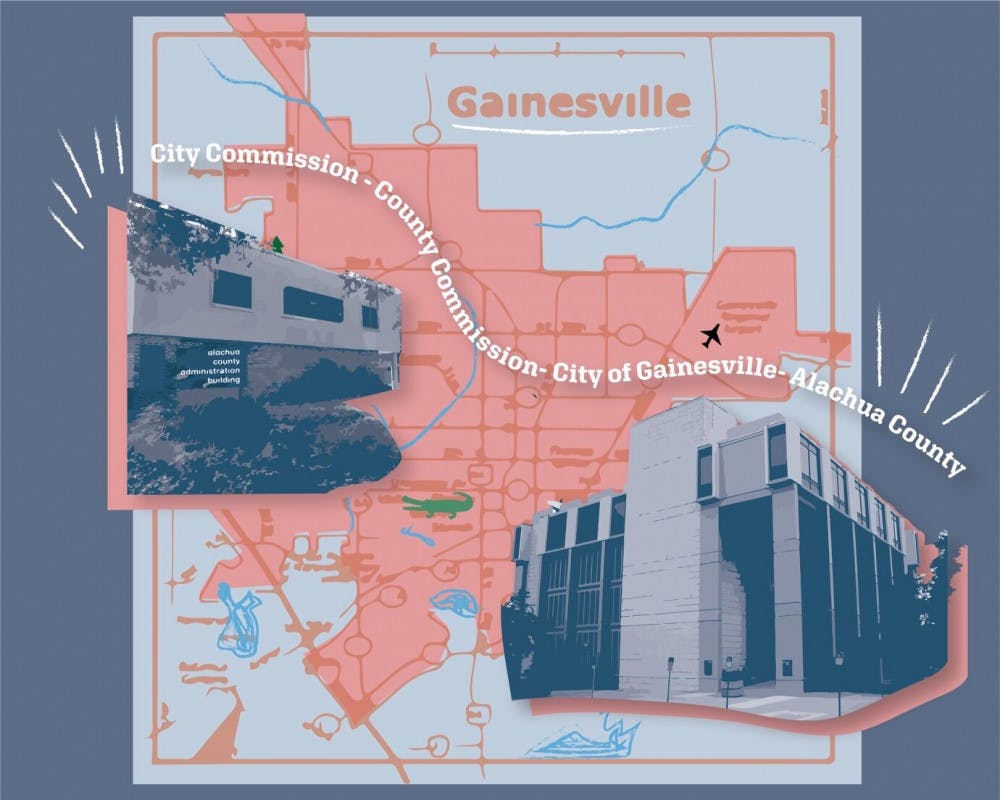Gainesville’s City Commission approved a motion to lead a lawsuit opposing Gov. DeSantis’ controversial HB 1 law, known as the “anti-riot law,” Thursday night.
The “anti-riot law” was signed April 19 as a response to last year’s nationwide protests over the killing of George Floyd, Breonna Taylor and other Black people killed by police. The law limits the ability of cities in Florida to lower budgets for their respective police departments, but increases penalties for protesters and gives more immunity to people who hit protesters on the streets with their cars. The lawsuit aims to reverse the law on the basis of it being unconstitutional.
The city commission originally approved a motion that teamed the city attorney’s office with lawyers from Community Justice Project and Public Rights Project to draft a complaint that could initiate a lawsuit. Both organizations are teams of lawyers dedicated to protecting people’s rights.
The lawsuit argues that HB 1 violates Florida’s home rule, which gives local governments authority to dictate how to run their cities. Additionally, it argues the law is too vague and does not guarantee state money to fund mandatory budget levels, which also goes against Florida’s constitution.
HB 1 would not let Gainesville reallocate police resources to different departments, which makes it harder to fund youth programs, Commissioner Gail Johnson said in a previous interview.
Youth programs were previously discussed in the community as a possible way to combat a rise in gun violence among Gainesville’s youth.
“The governor can go line by line over our police budget and decide what he wants to do with it, not us,” Johnson said. “That right there is problematic.”
Johnson did not respond to interview requests for this story.
“[HB 1] prevents cities from doing even the slightest or most minor budget reallocations,” Berbeth Foster, a senior staff attorney at Community Justice Project, said.
Additionally, if a city receives money from the federal or state government to fund things like police equipment, it will have to fund that same amount of money every following year, regardless of if it continues getting outside funding or not, Foster said.
Gov. DeSantis signed HB 1 into law because he believes defunding the police will make Floridians unsafe, Christina Pushaw, a spokesperson for the governor’s office, wrote in an email.
The fact that some Gainesville city commissioners oppose HB 1 shows they are interested in defunding the police, she wrote. Pushaw did not provide further response to the lawsuit on the grounds that it has not been officially filed yet.
Even if cities want to experiment with defunding the police, they have a right to decide that, Foster said.
She is optimistic the law is on their side and believes the lawsuit will be successful.
“We thoroughly believe that in the process of the governor seeking political brownie points, they were very sloppy in the drafting of this law,” Foster said.
During the city commission meeting Thursday, Commissioner Reina Saco expressed skepticism the lawsuit would be successful or worth the trouble.
“I would love to sue Ron DeSantis all day long, I would love for a lot of things to happen to Ron DeSantis,” Saco said. “I don’t want to enter this lawsuit because I worry about the precedent and the consequences of losing.”
The best case scenario is the lawsuit fails and the courts help get rid of the vagueness of the law, which could make the law stronger, Saco said.
The vagueness of the law gives cities freedom to continue to operate as they have in the past, Saco said. Furthermore, police budgets will likely increase anyway because of increased costs for things like cameras, training and the Gainesville Police Department’s mental health responder program. Saco said she does not want to start a fight over the law unless they are given a solid reason to.
Commissioner Adrian Hayes-Santos and Commissioner Harvey Ward agreed, and all three voted against the motion to sue.
At the meeting, Ward said he can’t vote to support the lawsuit without the city attorney fully onboard, and he cannot approve the lawsuit without other cities willing to join the lawsuit. He expressed concern over Gainesville being the only city out of the 400 in Florida willing to sue over the law.
City Attorney Nicolle Shalley told commissioners it is unusual for her office to pursue a lawsuit they think is not winnable and wants to avoid city matters becoming politicized.
“If that means I don’t have any courage, that’s cool, I’ll give you that,” Ward said.
The motion passed 4-3 with Commissioner Saco, Commissioner Ward and Commissioner Hayes-Santos voting against it citing the concerns raised by Saco and Ward. Mayor Lauren Poe joined Commissioner Johnson, Commissioner Desmon Duncan-Walker and Commissioner David Arreola in approving the motion.
“[HB 1] could trigger a state take over the budget,” Johnson said. “It was specifically enacted to intimidate and obstruct cities like Gainesville.”
The City of Miramar will vote on whether to join the lawsuit August 18, Jonathan Miller, the Public Rights Project legal director, said.
He said other cities are also interested in joining and he’s optimistic in their ability to build a coalition of cities to join the lawsuit. He did not provide names of other cities that have expressed interest.
Miller said he believes it’s important to fight HB 1 now because of a trend in similar restrictive laws around the country, but especially in Florida.
“It is a growing trend of taking power away from local government,” Miller said. “[The lawsuit is] about standing up for community partners and community activists, and local elected officials who want to see changes happen.”
Contact Alexander Lugo at alugo@alligator.org. Follow him on Twitter @AlexLugo67.

Alex is a fourth-year journalism student at UF and is in his third semester at The Alligator where he is serving as the university editor. He previously reported on university administration and the city and county commission. In his free time, he enjoys video games, traveling and being outdoors.






